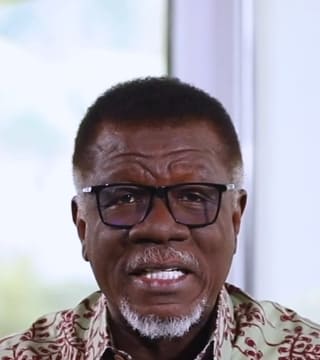Mensa Otabil - Pharaoh's Trickery (10/15/2025)
We’re still looking at Exodus chapter 10, and we are in verse 24. Then Pharaoh called to Moses and said, «Go serve the Lord, only let your flocks and your herds be kept back; let your little ones also go with you.» The plague had lasted for three days. For three days, there was gross darkness in Egypt, and after the three days, Pharaoh summons Moses and offers him what would seem like what Moses is looking for. He says, «All right, time out, we’ve suffered enough. Now let your people go.»
So he says to Moses, «Go and serve the Lord.» He says, «Don’t just go and serve the Lord; go with your children as well.» In other words, go with everybody-go and serve the Lord. On the face of it, it will appear like this is what Moses has been looking for all this time: go and serve the Lord, and the children go to serve the Lord. But Pharaoh was not done. He opened a small window, but then the window has a limitation, and so he introduces the limitation. He says, «Only let your flocks remain.»
So go and serve the Lord; go with your families, go with your children, go to the wilderness, do whatever you want, but let your flocks remain. Now why is this a trick opportunity? It’s a trick opportunity because the flocks of Israel were their mainstay. Israel came to Egypt rearing animals; they were shepherds. So if they go out into the wilderness and their flocks remain, it means they will have freedom, but they’ll have no wealth. They have no economy, no ability to sustain themselves. They could go and leave their wealth behind, but the net effect of it is that if they go out to the wilderness and they have no economy and they can’t sustain themselves, they will be poor, they’ll be hungry, they’ll be depressed, and they will run quickly back to Egypt.
So that’s what Pharaoh is gambling on: let me give them freedom without wealth, and they will come back. Secondly, if the flocks remain, some people have to remain to take care of the flocks. If they went to the wilderness, some people will still remain. So if you look at it carefully, he’s not giving them freedom. It seems like freedom, but it’s not freedom; it’s tricky, it’s crafty, and it’s not real. Any kind of freedom that you receive, whether it’s a nation, a government, or whatever entity, that does not give you the ability to self-sustain — whether with wealth or with your ability to sustain yourself-is not true freedom. That freedom will get you into trouble, and you will run back this time asking freely to be oppressed again, asking freely to be put back into bondage.
That’s what Pharaoh is gunning for. So we cannot just seek freedom and say we want to be free without our flocks, without our herds, without our source of livelihood, also having the freedom to express itself. And I believe that is how Satan operates: he offers us something that looks great on the surface, but when you look down, you realize that he hasn’t really given you much. He made you feel that you are free, but he is still holding on to your life, still controlling you. We have to be wise and not fall for the tricks of the enemy. But the important lesson to learn is that when God gives us freedom, our flocks and herds, our economic facilities, should also have the freedom to serve the Lord as we serve Him.
Let’s pray. With me, Heavenly Father, I will serve you with all that I have. I will not hold back in serving you with my wealth. In Jesus' name, amen.

